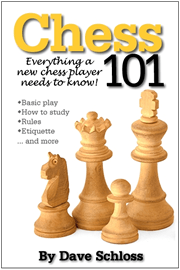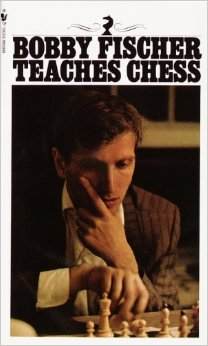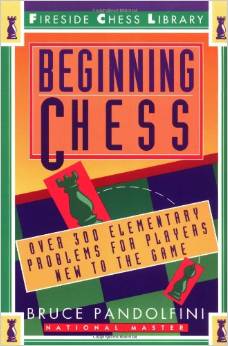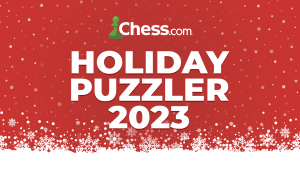
5 Great Chess Books For Beginners
Like it or not, holiday gift-shopping season is now upon us, at least according to the ubiquitous calendar of commerce.
Instead of being trampled by unruly deal-seekers at big box retail stores, you can shop online and still get something thoughtful for the chess beginner on your list.
For our list, we polled the Chess.com content team for its choice of the best chess books for beginners.
Let us know which beginner books you recommend in the comments and on Facebook.
1. Chess 101 by Dave Schloss
Selected by IM Daniel Rensch.
Author Dave Schloss describes Chess 101 as a self-contained beginner’s chess course.
The book offers everything a complete beginner would need to know to play the game, from topics as basic as the board and pieces, to the structure and rules of chess tournaments.
It also includes sections on how to study chess and tips for winning your first games.
"The moment I opened Chess 101, I knew Dave had accomplished something great: a truly simple guide to learning and enjoying the game,” said IM Daniel Rensch, who selected this book.
“Many attempt this feat, but few beginner chess manuals really succeed in keeping things simple while highlighting the best parts of the game of chess,” said Rensch.
2. Bobby Fischer Teaches Chess by Bobby Fischer and Stuart Margulies
Selected by IM Daniel Rensch.
This paperback, also recommended by IM Rensch, is one of the best-selling chess books of all time.
Fischer’s beginner book focuses on teaching tactics via “programmed instruction,” which asks the student to actively answer questions on every page.
Bobby Fischer Teaches Chess crams so many tactical positions into the course that when you think you’ve reached the end, you can turn the book around and read back-to-front for more tactical problems printed on the opposite pages.
“This book was one of the first experiences I had learning the game of chess,” said IM Rensch.
“Later,” said Rensch, “I realized it was truly one-of-a-kind, in that it was the first ‘beginner's book’ written by a world champion! Fischer's approach is simple, yet innovative and deep. It takes the right steps towards building the fundamentals of a strong chess player!"
3. Winning Chess Strategies for Kids by Jeff Coakley
Selected by FM Mike Klein.
Designed for children 7 to 13 years old, Winning Chess Strategy is part of a series of beginner workbooks by Jeff Coakley.
The workbook starts with the rules of chess and quickly progresses to strategic ideas like opening principles and piece development.
It also includes sections on tactical combinations, endgame technique, and middlegame planning.
“Nothing beats the workbooks by Jeff Coakley,” according to FM Mike Klein, who said they were “used a ton” when he was teaching children chess.
4. The Steps Method by Rob Brunia and Cor van Wijgerden
Selected by CM Peter Doggers.
The Steps Method is really a full beginner’s chess course, featuring six training manuals and 20 workbooks. The course and books were developed from material by two Dutch chess teachers.
The Steps have been used primarily in Europe to teach children to play, but the course is “gaining popularity throughout the world,” according to its publisher. Of the 27 total books available in the course, 26 have been translated to English.
The course is based, obviously, on a step-by-step program to build one level of chess learning on previously mastered material. The books urge teachers not to proceed to the next lesson until “the student can use the material in his games regularly.”
CM Peter Doggers, also from the Netherlands, recommends the course, calling it “pretty good stuff.”
5. Beginning Chess by Bruce Pandolfini
Selected by Pete.
National Master Bruce Pandolfini is a columnist for Chess.com and ChessKid.com, but he is also well known for his bibliography of chess books aimed at beginning and intermediate players.
Beginning Chess includes an introduction on the rules of the game before proceeding to the heart of its material, more than 300 instructional chess problems.
Pandolfini offers a scoring system for the student, who can rank his or her progress and results on a graded scale of categories from beginner to master class.
In my opinion, the best part of Beginning Chess is how easy it is to pick up and do a few problems without needing a lot of time to sit down and study. It’s the perfect book for busy beginners who want to improve in their spare time.
Free Bonus: ChessKid.com Curriculum
Unlike the books listed above, the ChessKid Curriculum is completely free — just download and start reading, or print the lessons for easy reference.
Designed by IM Daniel Rensch, the curriculum includes diagrams, worksheets and mini-games to teach chess concepts through practice.
The curriculum also offers advice for coaches or parents on how to most effectively teach their chess students.
What are your favorite beginner's chess books? Let us know in the comments.
GET THE MOST OUT OF CHESS.COM
- Read Pete's previous article: The All-Time World Chess Championship Bracket: Finals.
- Read NM Bruce Pandolfini's articles on ChessKid.
- Watch FM Elliot Liu's Amazing Games For Beginners video.
- Check out some of our fun video lectures: IM Rensch and GM Finegold are two of our most popular authors.
- Have fun and learn at the same time with the Tactics Trainer.
- Looking for articles with deeper analysis? Try our magazine: The Master's Bulletin.












